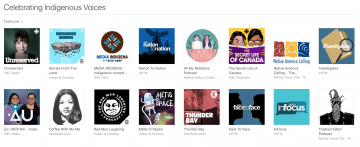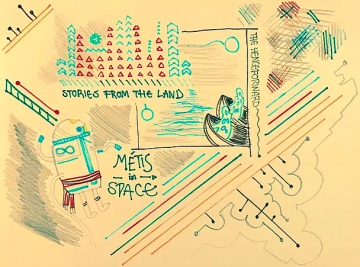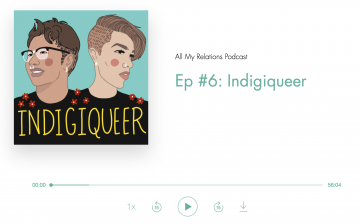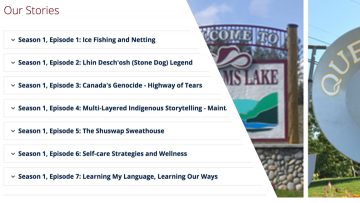With the rise of technology, digital media has become a medium for the creation and dissemination of Indigenous oral traditions through podcasting. Podcasts developed and hosted by Indigenous people aim to reclaim oral traditions and celebrate stories from an Indigenous perspective. Driven by the desire of Indigenous peoples to assume agency over their representation, Indigenous podcasts have emerged as a tool to decolonize the airwaves. This week in the mentoring circle, we examine how podcasting allows Indigenous stories to be broadcast worldwide in a way that gives Indigenous peoples more agency, flexibility, and creative liberties that consequently challenge colonial legacies and stereotypical representations within them. Indigenous podcasting is not just a medium; it is a catalyst for change, empowerment, and cultural resurgence.

In the ever-evolving landscape of digital storytelling, Indigenous podcasting stands out as a transformative force, providing a unique platform for Indigenous voices to be heard. Podcasting grants Indigenous communities agency in storytelling, allowing them to dictate their narratives. This agency is crucial in challenging historical misrepresentations and fostering a deeper understanding of Indigenous cultures. Indigenous podcasts are reclaiming the narrative by sharing stories of resilience, identity, and cultural richness. Podcasting emerges as a tool that not only preserves oral traditions but also empowers Indigenous peoples to resist systems of oppression. For example, The Henceforward is a podcast that started as part of a graduate course called Decolonization, Settler Colonialism and Antiblackness taught by Dr. Eve Tuck at OISE. It considers relationships between Indigenous Peoples and Black Peoples on Turtle Island — click on the image to learn more.
The intersection of digital media, podcasting, and Indigenous storytelling, has made content as numerous and varied as the Indigenous communities represented. New Journeys created a list of 11 Indigenous podcasts for your listening pleasure, the list covers a wide range of Indigenous podcasters putting out ground-breaking content for your heart and soul. From issues of representation in mainstream media with All My Relations to creating space for Indigenous resurgence by disrupting colonial systems with 2 Crees in a Pod, you can find Indigenous podcasts about everything. My all-time favourite episodes are a feature of botanist and member of the Citizen Potawatomi Nation, Robin Wall Kimmerer on On Being with Krista Tippett talking about The Intelligence of Plants and Episode 6 of the All My Relations Podcast called Indigiqueer which joined forces with two amazing Indigenous queer writers, Joshua Whitehead and Billy-Ray Belcourt.
Indigenous Teacher Candidates enrolled in NITEP’s Cariboo Field Centre also created, developed and published a series of podcasts that are being featured on NITEP’s website through the Grease Trail Digital Storytelling project. The podcasts consider the importance of Indigenous storytelling and explore land-based teaching strategies for creating digital storytelling resources. The Grease Trail Digital Storytelling project is a land-based experiential learning opportunity for Indigenous pre-service teachers in rural communities of north-central BC, to engage in traditional Indigenous storytelling practices in digital teaching and learning contexts. Go to the Grease Trail Digital Storytelling website and take a moment to listen to seven podcasts created by NITEPers, ranging from 6 to 18 minutes in duration and produced on unceded territories of Tŝilhqot’in, Dakelh, and Secwépemc First Nations.
Red Man Laughing is an Indigenous podcast hosted, created and produced by Anishinaabe comedian Ryan McMahon. Ryan’s storytelling comedy style is fast-paced, loose & irreverent. In an episode from season 3 of the Red Man Laughing podcast, Ryan McMahon takes you into the world of podcasting with a “How To Podcast” adventure. He gets asked all the time about how someone can get started podcasting and the answer is quite simple – start recording yourself. Listen to this podcast episode to learn the ins and outs of podcasting as he covers the basics of “How To Podcast” by focusing on 5 essential elements:
- The w 5 – who, what, where, when, why, how.
- Equipment/gear
- Website & Publishing
- RSS feeds & Subscribers
- Creating the show – formats, lengths & more
The essential how-to podcast is this: plan to record something, record something, publish what you’ve recorded with a podcast host (with an RSS feed), post what you’ve recorded on a website or websites, promote & cross-promote what you’ve recorded on social media, blogs, websites & email newsletters and repeat.
Since the colonization of Turtle Island, Indigenous peoples were treated as if the absence of written documentation, in favour of oral storytelling, nullified their knowledge and worldviews. The oral methods Indigenous peoples used to record stories and pass down knowledge through generations faced erasure due to assimilation policies that sought to indoctrinate Indigenous children. For Indigenous peoples to govern themselves, they must govern their stories and the ways of telling those stories; podcasting allows this to happen. Through the rising trend of Indigenous podcasting, Indigenous peoples have the power to expand the limits of technology and shape the way are represented. As we immerse ourselves in the diverse world of Indigenous podcasts, we embark on a journey of shared humanity and appreciation for the strength of Indigenous voices.

From Indigenous Podcasting: resisting the colonial paradigm (Taylor Mitchell, 2017).


